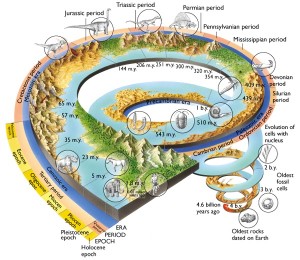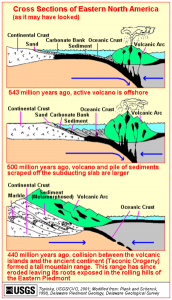 Let your imaginations wheel in from those galaxies millions of light years away to a moment of ease – you are lying on your back on warm grass on a late spring morning. Cumulus clouds drift southwest above you. The morning ticks by in concert with their passage. This is one way we measure time; we can actually feel its progress in cadence with the movement of individual clouds and with their sky-full banks.
Let your imaginations wheel in from those galaxies millions of light years away to a moment of ease – you are lying on your back on warm grass on a late spring morning. Cumulus clouds drift southwest above you. The morning ticks by in concert with their passage. This is one way we measure time; we can actually feel its progress in cadence with the movement of individual clouds and with their sky-full banks.
Your afternoon will follow your morning; day will give way to day. Summer will follow spring; month will give way to month.  These passages will become a blur, but memory will freeze some images and events. When we bring them back, we isolate time. We freeze it in our mind’s eye as it quietly passes through and around us. But years still become decades. Familiar landscapes change. Grandparents leave us; then parents. A dozen processes of loss and gain continue to shift forward. Our bodies age. In all these fashions, we can grasp how time functions on a human scale. On that scale, we have a chance to make a mark, change lives, create a legacy, be remembered – we might be comforted by imagining that our names and stories will spread out beyond our passing, that they will become a residue of our energy still capable of animating others, maybe even of provoking action in them.
These passages will become a blur, but memory will freeze some images and events. When we bring them back, we isolate time. We freeze it in our mind’s eye as it quietly passes through and around us. But years still become decades. Familiar landscapes change. Grandparents leave us; then parents. A dozen processes of loss and gain continue to shift forward. Our bodies age. In all these fashions, we can grasp how time functions on a human scale. On that scale, we have a chance to make a mark, change lives, create a legacy, be remembered – we might be comforted by imagining that our names and stories will spread out beyond our passing, that they will become a residue of our energy still capable of animating others, maybe even of provoking action in them.
Now, shift.
 Leave that warm grass and warm sun where you reclined and watched the sky. Imagine that you are falling into the future; unafraid, you sense your speed leaping, surging, smashing through all barriers, through centuries, then millennia, then epochs. Calmly, you watch rivers shift course, forests wash across valleys, die, pour forth again. Faster still. Mountain chains inflate, crumble, and are replaced by others. An ocean appears. Disappears. You sense magnetic poles skipping beneath the ground under you. The continents blunder across the planet like drunken skaters on a small pond. God-like, you take in all this astonishing, endless flow of energy, your stillness the only unchanging space in the center of time’s relentless transformations of the physical world. Creatures as evanescent as water vapor, human beings are nowhere seen here.
Leave that warm grass and warm sun where you reclined and watched the sky. Imagine that you are falling into the future; unafraid, you sense your speed leaping, surging, smashing through all barriers, through centuries, then millennia, then epochs. Calmly, you watch rivers shift course, forests wash across valleys, die, pour forth again. Faster still. Mountain chains inflate, crumble, and are replaced by others. An ocean appears. Disappears. You sense magnetic poles skipping beneath the ground under you. The continents blunder across the planet like drunken skaters on a small pond. God-like, you take in all this astonishing, endless flow of energy, your stillness the only unchanging space in the center of time’s relentless transformations of the physical world. Creatures as evanescent as water vapor, human beings are nowhere seen here.
I’ll make this personal. The high school where I taught sits about 500 feet above sea level on an east-west ridge line. Four hundred forty million years ago an enormous island crashed into an ancient continent. Bang and Up went those hills (over more millions of years); they eroded (over more millions and millions of years);then they became densely wooded climax forests, and one became a hay field, and it became a high school.
Pitted against the weight of geological time, we can offer our bodies, these shells of water, blood, organs and muscle. We can offer 100 billion neurons in the casing of the brain and their abilities to apprehend that which is good. We can offer our sorrow, the most authentic ambassador of our empathy:
A moment in the Albanian mountains in 1940 with a Greek fighter and his horse:
“Spyros Triantafillos grieved at abandoning his beloved grey horse after it broke down in a snowdrift: ‘Starving, soaked to the bone, tortured by endless movement on rocky ground, it was doomed to stay there. I emptied my saddlebags to follow the others on foot, then stroked the back of its neck a little and kissed it. It might be an animal, but it had been my comrade in war. … I saw it looking at me as I walked away. … It revealed so much anguish, so much sadness. I wanted to cry, but the tears did not come. War leaves no time for such things. Momentarily I thought of killing it, but couldn’t bear to do so. I left it there, staring after me until I disappeared behind a rock (114-115).’”*
We can offer our refusal to yield:
On an Atlantic Convoy ship after being torpedoed by a U-boat in 1942:
“An engineer officer of the mortally injured Trinidad refused to try to abandon his stokers, almost invariably doomed men when ships sank. Though concussed by bomb blast, he was last seen crawling to try to free them from beneath jammed hatches, even as his cruiser foundered. His name should be known to posterity: Lt. John Boddy (283).”*
Mortal and flimsy as we are, we can offer our commitment to witness and remember.
*Inferno: The World at War, 1939-1945by Max Hastings